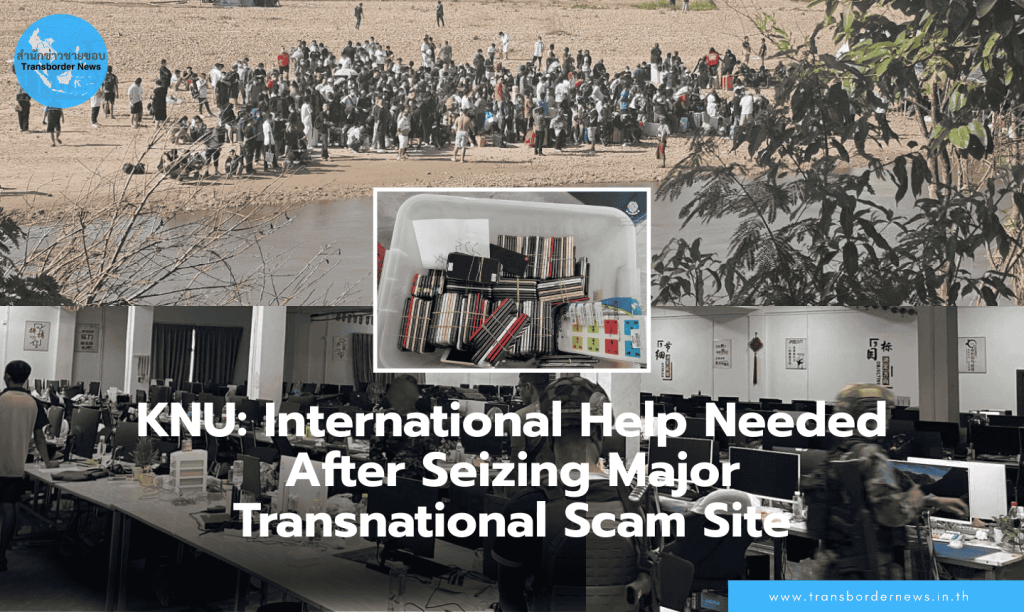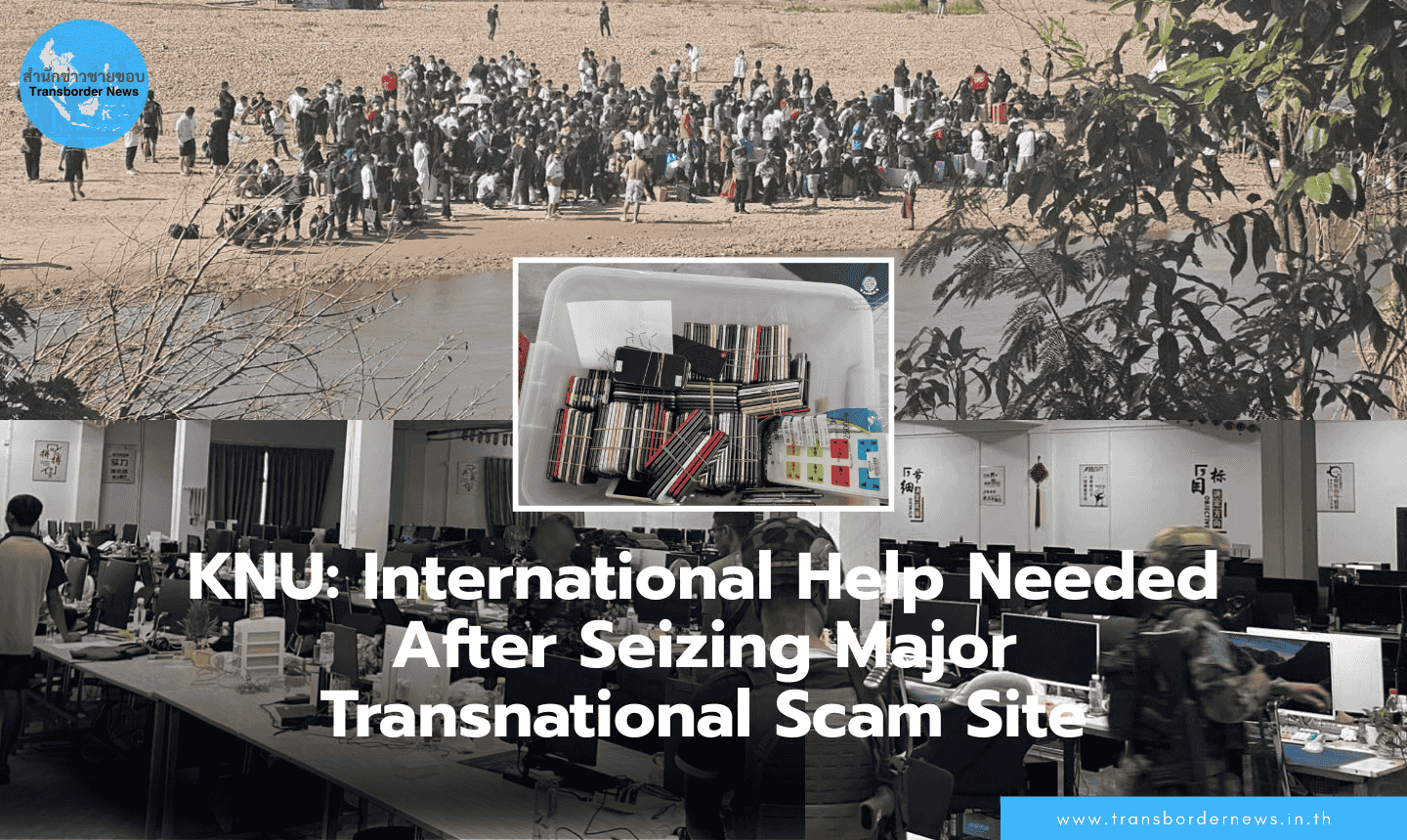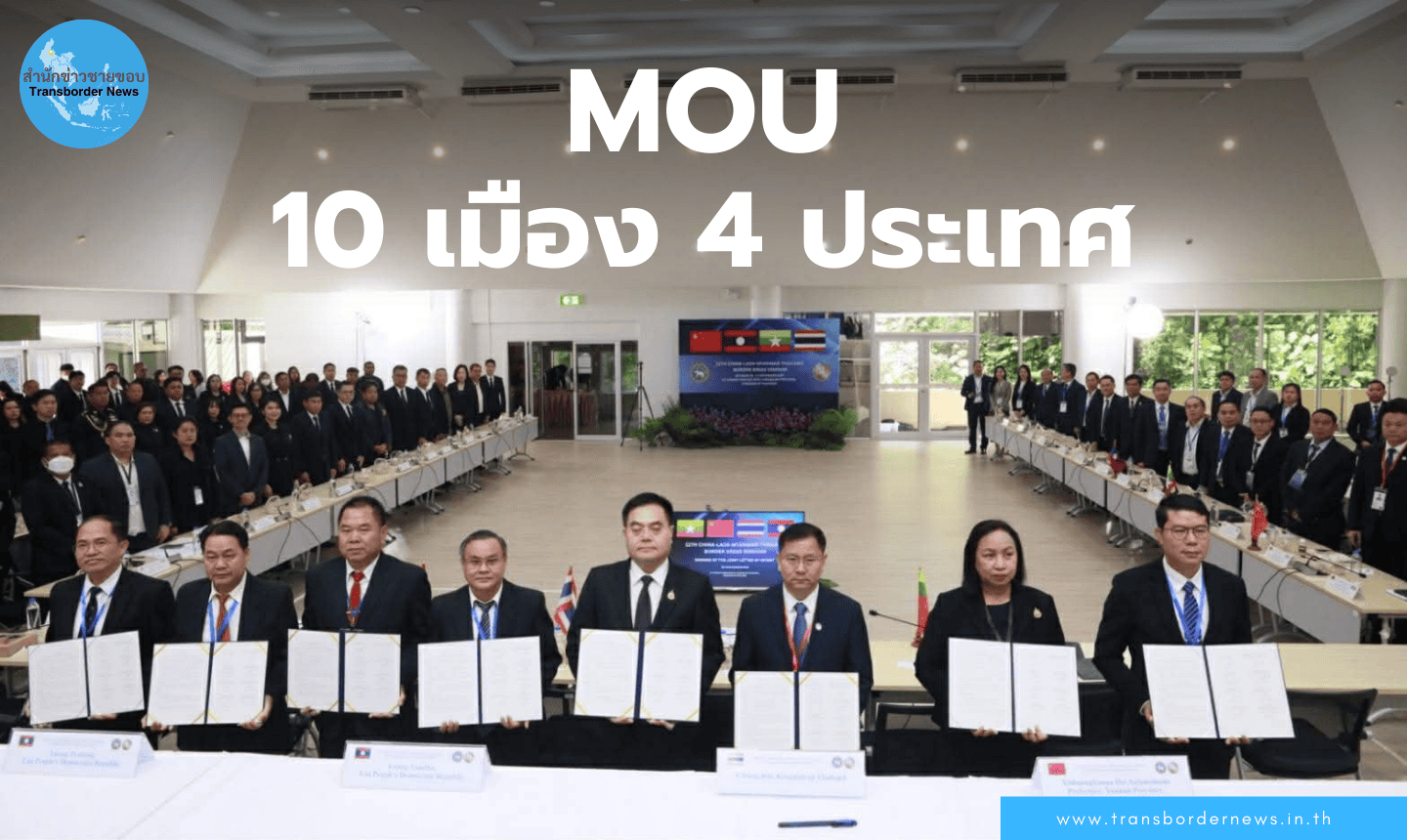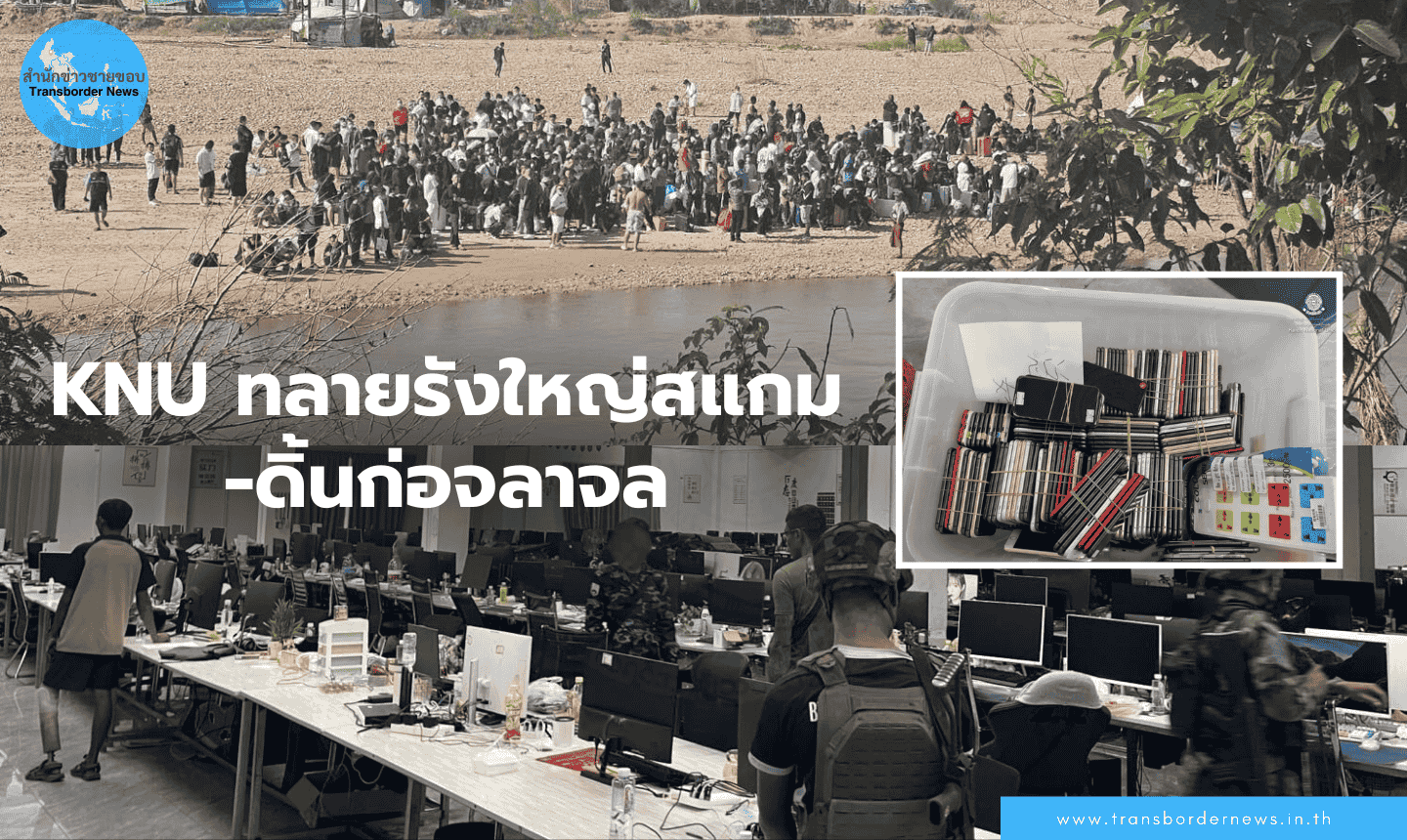
On 26 November, Padoh Saw Taw Nee, spokesperson of the Karen National Union (KNU), told Transborder News about the recent KNU operation to seize a major transnational crime compound and online scam syndicate located inside the territory of the Democratic Karen Benevolent Army (DKBA).
The area, known as Min Let Pan, is 16 kilometers from Myawaddy and directly opposite Ban Huai Mahawong in Mae Sot District, Tak Province, Thailand. According to Saw Taw Nee, more than 1,000 foreign nationals inside the compound are seeking to escape the criminal site. The KNU has started registering people from approximately 20 buildings; more than 700 individuals, almost all of them Chinese, have already registered.
Saw Taw Nee said that on 25 November a riot broke out inside the compound, while at the same time the Myanmar military launched heavy artillery fire aiming to retake the area. This made managing the situation extremely difficult. The events follow a series of attacks beginning on 21 November, when the Myanmar military launched an operation to retake the area. During the fighting, DKBA troops led by Aung Lwin, a subordinate of Sai Kyaw Hla — who is sanctioned by the U.S. — assisted the Myanmar military. However, the KNU successfully took control of DKBA’s stronghold and DKBA soldiers surrendered.
“We found that the area had strong defensive systems and was conducting clearly illegal operations. Thousands of people of various nationalities were being detained. We have restricted the movement of suspects to prevent them from fleeing,” Saw Taw Nee said.
After securing the area, the KNU began planning how to handle the estimated 4,000–6,000 foreign nationals held across the buildings. On 23 November the KNU began screening people, identifying 29 Thai nationals, who were immediately returned to Thailand. On 24 November operations continued. The KNU identified 36 Chinese nationals believed to be mid-level managers—not the top bosses—but building supervisors and individuals involved in assaulting victims. These 36 were handed over to an international task force on the Thai side. The KNU also seized tens of thousands of mobile phones, hundreds of computers, and numerous safes that have yet to be opened; these will be handed to the joint task force.
“On the night of the 24th, a group of Chinese detainees began causing disturbances, throwing objects from buildings. On the morning of the 25th they set fires inside, fought among themselves, and manufactured false incidents. When we tried to control the situation, we found that the troublemakers were Chinese themselves. Some began posting online claiming the KNU was attacking them. There was a huge amount of misinformation on social media. The KNU denies harming any civilians. We found that one Chinese person has died and many were injured—we must still determine the cause of death. Medical teams have been deployed,” Saw Taw Nee said.
He added that many of the Chinese who were rescued wanted to return to China. Throughout the night of 25 November, 692 Chinese nationals were transferred into Thailand. Another 26 women from Laos and Vietnam were also handed over to Thai authorities.
“There are still many foreigners, especially Chinese, inside the buildings. The KNU has asked them to register, but they refuse. Some say they do not want to return to their country and are ready to stage incidents. We assess that they pose a risk of violence; some have weapons. Directly storming the buildings would be dangerous. For now, we allow only those who want to leave to register. They are fighting among themselves and blocking each other,” he said.
When asked about the plan for the remaining Chinese nationals, Saw Taw Nee said the KNU has coordinated for those who want to leave to come out first. The Chinese Embassy in Yangon has told the KNU to send Chinese nationals to Myawaddy, “but that is impossible due to ongoing fighting.” The only feasible option is to transfer them to Thailand, which can then return them to Chinese authorities.
“If government leaders from each country held discussions and issued orders, operations would run more smoothly. Coordination on the ground is ongoing, but we have not seen clear directives from higher levels. We have also not seen a clear position from the Chinese government,” he said.
On the Myanmar military’s attempt to retake the DKBA-controlled area, the KNU spokesperson noted that many DKBA leaders are under international sanctions. “If they continue their previous practices, they will face international pressure.”
Asked about accusations that some KNU leaders benefited from scam groups, Saw Taw Nee acknowledged that past leaders had approved land leases that later enabled scam compounds to emerge. However, the KNU subsequently set up an investigative committee and summoned those responsible, but these individuals refused to cooperate. “We will take decisive action,” he said.
Regarding Myanmar state media reporting that the junta is cracking down on scam centers while simultaneously cooperating with the DKBA, he said:
“The root of the scam problem is the Myanmar military regime. Since the 2021 coup, the junta has lost almost all legitimate revenue from trade—over 90 percent of border trade routes. Meanwhile, income from scam operations has grown and become a major revenue source. Therefore, the junta has turned to supporting armed groups that lack clear political principles and prioritize financial gain. The junta works with them and uses scam money to run its operations.”
“The junta claims it is destroying scam phones and computers. These items must be preserved for forensic investigation, not destroyed. The junta is trying to eliminate evidence because critical information is stored in these devices. The KNU will not do that—we will preserve all evidence so experts can extract data.”
Saw Taw Nee added that the KNU found companies registered with the Myanmar government inside the buildings, but the junta’s own raid on KK Park did not disclose such company names. “We will try to reveal these links. All this information should be made public. We aim to expose the entire scam network.”
“With the KNU’s limited resources, we cannot handle this crisis alone. We urgently need international support and cooperation to shut down these illegal operations. Even one area of this scale requires enormous effort. We have previously helped victims discreetly, without any budget. But fighting scam syndicates—funded by massive amounts of money and operating in multiple locations—requires international assistance. We can operate inside the territory, but we need backing from many countries,” he said.
On the same day, the DKBA issued a statement from its general headquarters (Saw Si Myint) declaring that “DKBA does not allow any armed groups to move through the Phalu Noi – Wah Lay – Zu Ka Li route. Any urgent need must be reported in advance.”
This route, linking Myawaddy to Zu Ka Li along the Moei River and passing through KNU-controlled areas, is a strategic corridor. The announcement was aimed at preventing KNU from using it.
Earlier that morning, near Huai Mahawong, Mae Ko Ngoen Village in Mae Sot District, a group of foreign nationals—mostly Chinese—from the Min Let Pan scam compound gathered waiting for boats to cross the Moei River, while some attempted to flee into Thailand under the cover of darkness. Thai paramilitary rangers, Border Patrol Police 346, and Taskforce 35 tightened security to prevent illegal crossings.
This is a translation of original Thai news article https://transbordernews.in.th/home/?p=44555




